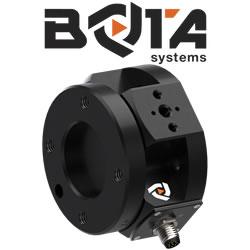IEEE Honors Robotics and Control Systems Expert, John Wen
Robotics and control systems expert John T. Wen, head of the Department of Industrial and Systems Engineering (ISE) at Rensselaer Polytechnic Institute, recently received the 2013 Transition to Practice Award from the IEEE Control Systems Society.
This prize is awarded by the professional society "to recognize outstanding university-industry collaboration that enables the transition of control and systems theory to practical industrial or commercial systems." Wen's award was to honor his development of the Adaptive Scanning Optical Microscope (ASOM) and a high-precision laser scanning system for the electronic manufacturing industry.
Wen's ASOM addresses a known limitation inherent to the automated optical microscopes used widely in industry - the trade-off between the size of view and image resolution. To overcome this challenge, ASOM uses real-time image processing to identify and scan the field of interest. The scanned images are then assembled into a mosaic, providing a much larger field-of-view at very high resolution, without the need for switching lenses or moving the sample. Wen holds two patents for ASOM technology, which combines optics, mechanical design, electronics, and control systems.
Wen earned his doctoral degree in electrical engineering from Rensselaer in 1985, after which he worked as a researcher at NASA's Jet Propulsion Laboratory. In 1988 he joined Rensselaer as a faculty member in the School of Engineering. Wen has served since 2005 as director of the interdisciplinary Center for Automation Technologies and Systems (CATS) at Rensselaer, and earlier this year was named department head of ISE.
A prolific researcher, Wen has authored or co-authored more than 200 publications for leading journals and conferences. His work is in the areas of control systems and dynamic systems modeling, with a particular focus on robotics for industrial automation. Applications of Wen's research include high-performance motion systems, robot manipulation, optomechatronics systems, and thermal management.
As director of CATS, Wen helps partner companies leverage the knowledge and expertise of Rensselaer faculty and students toward solving real-world advanced manufacturing challenges. CATS is a New York state designated Center for Advanced Technology and receives annual funding of nearly $1 million from the Empire State Development (ESD) Division for Science, Technology and Innovation. Over the past five years, CATS has leveraged this investment to help its industrial partners deliver upward of $259 million in non-job economic impact, create 293 new jobs, and retain 449 jobs in New York.
Wen is a fellow of IEEE, and from 2004 to 2009 served as an overseas assessor for the Chinese Academy of Sciences. In 1997 he was a senior visiting scientist for the Japan Society for the Promotion of Science, and in 1993 was a summer faculty fellow for NASA and the American Society for Engineering Education.
Prior to earning his doctoral degree from Rensselaer, Wen received his bachelor's degree in electrical engineering from McGill University and his master's degree in electrical engineering from the University of Illinois at Urbana-Champaign.
http://www.rpi.edu
Featured Product

